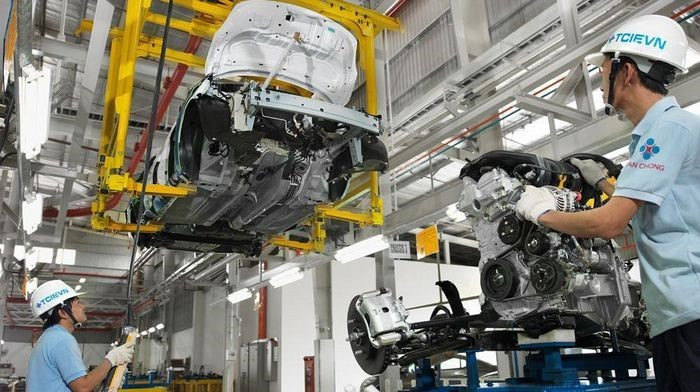Many policy bottlenecks make car prices in Vietnam twice as high as in Thailand.
Car prices in Vietnam are nearly twice as high as in Thailand and Indonesia and higher than in the US and Japan, according to the Ministry of Industry and Trade, mainly due to taxes and fees.
Car prices in Vietnam are twice as high as in Thailand, higher than in the US and Japan.
In the latest report sent to the Ministry of Finance, the Ministry of Industry and Trade said that there are currently more than 40 enterprises manufacturing and assembling cars with output meeting about 70% of domestic demand for cars with less than 9 seats.
Many major car manufacturers in the world also have production and assembly activities in Vietnam, some of which have deeply participated in the global production chain. Trucks and buses have been exported to Thailand and the Philippines.
With the current production capacity of enterprises reaching 323,892 units, the Ministry assessed that it is more than 1.4 times higher than the target set out in the Vietnam Automobile Industry Development Strategy to 2025, with a vision to 2035 (227,500 units).
However, currently, car prices in Vietnam are nearly twice as high as in Thailand, Indonesia and higher than in countries with stable auto industries such as the US and Japan.
According to the Ministry of Industry and Trade, the reason why car prices in Vietnam are higher than in Thailand and Indonesia is because taxes and fees in Vietnam are higher than in the above countries.
 |
Vietnam's auto industry still has many bottlenecks. Photo: Tuan Vu |
According to the Ministry of Industry and Trade, according to regulations, each car that wants to roll on the road will have to pay taxes, including import tax (except for domestically produced and assembled cars), special consumption tax, and value added tax. In addition, cars are also subject to fees, such as registration fees, inspection fees, road maintenance fees, car license plate fees, and compulsory civil liability insurance fees.
Another reason given by the Ministry of Industry and Trade is that domestic accumulated output is low, meaning that businesses are producing far below their design capacity.
The quality of domestically produced and assembled cars is not equal to imported cars, and a system of large-scale raw material suppliers and component manufacturers has not yet been established.
Policy bottlenecks
According to the Department of Industry (Ministry of Industry and Trade), the current size of Vietnam's automobile market is only 1/3 of Thailand's and 1/4 of Indonesia's.
According to this Department, currently the cost of producing cars domestically is 10-20% higher than that of other countries in the region, causing the cost of domestically produced cars to be at a disadvantage compared to cars imported from ASEAN in the context of tariff barriers being removed.
The reason is that the current market capacity of the Vietnamese automobile industry is still small, so it cannot take advantage of the industry's economies of scale, causing costs to be higher than in other ASEAN countries that have had a market and automobile industry far ahead.
Components and spare parts for automobile production and assembly must mostly be imported from abroad - incurring additional costs for packaging, transportation, storage, insurance, etc., thereby affecting the cost of domestically produced and assembled vehicles.
Talking to Lao Dong, economic expert Pham Chi Lan commented that the biggest difficulty for businesses making "Made in Vietnam" cars is the high level of competition. Vietnamese businesses have to directly compete with the world's auto giants, which were formed and established decades ago.
These businesses have tradition, technology, experience, and market. Therefore, Vietnamese businesses must compete fiercely to survive.
Besides, the price of Vietnamese cars is high compared to imported cars, especially compared to some low-cost import markets such as China, India, Indonesia, and Thailand when Vietnam reduces import tax according to FTA commitments.
Once the price is high, it will be very difficult for Vietnamese car manufacturers and assemblers to compete. Meanwhile, competing with brands is even more difficult, because the general psychology of consumers still trusts Japanese and Korean cars more than domestic cars.
To further develop and create momentum for Vietnamese cars, Ms. Pham Chi Lan said that there needs to be policies to facilitate them.
In 2020, Vietnam issued a very good policy to reduce and abolish import tax on components for domestic assembly enterprises that cannot produce. This has caused car enterprises to increase localization in Vietnam to enjoy tax instead of massively importing in the region as before.

